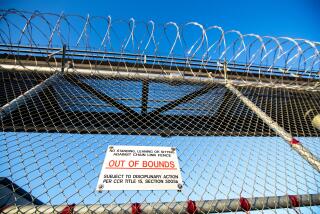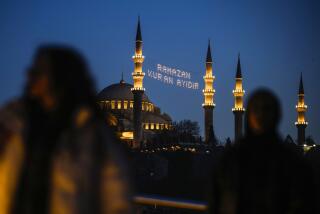Turkey lifts ban on Islamic head scarves, veils in civil service jobs
The Turkish government decreed Tuesday an end to a nearly 90-year-old ban on wearing Islamic head scarves and veils in civil service jobs, threatening to rekindle the secular vs. religious showdown that ignited weeks of unrest in late spring.
The ban, imposed at the dawn of modern Turkey’s statehood, was intended to separate religious practices from government operations and will remain in effect for law enforcement officers, judges, prosecutors and military personnel.
But anyone interfering with what he termed a woman’s right to cover herself in public will face a prison term of up to three years, Prime Minister Recep Tayyip Erdogan said at a news conference announcing a slate of legal changes, the Hurriyet Daily News reported.
Erdogan justified the departure from modern secular behavior in state offices as removing an obstacle to employment of women who choose to veil themselves in public, according to conservative Islamic tradition. The edict is seen by critics as another attempt to reinstate the Islamic symbols and practices eradicated by Turkish founder Mustafa Kemal Ataturk in 1925 after the fall of the Ottoman Empire.
Erdogan called the decades-long ban “a dark period” being brought to an end as part of his package of so-called democracy enhancements.
Among other reforms made law with their publication in the Official Gazette were the right of private schools to teach in languages other than Turkish, the restoration of traditional Kurdish names for towns and villages, and the scrapping of a nationalist oath that had been read in schoolrooms for decades, Hurriyet reported. The oath, ending in the declaration that “how happy is he who says ‘I am a Turk,’ ” was considered offensive by Kurds and other minorities in Turkey.
The ruling party portrayed the veiling ban as an infringement of women’s rights to free expression.
“A regulation that formally intervened in freedom of clothing and lifestyle -- a source of inequality, discrimination and injustice among our people -- has become history,” Deputy Prime Minister Bekir Bozdag proclaimed via Twitter. [Link in Turkish]
Erdogan and his ruling Justice and Development Party had already removed the ban on head scarves and veils for college students in 2008. The prime minister, who is thought to be preparing a run for president next year when his term limit as government chief is exhausted, praised the restoration of women’s right to cover their heads and faces as “a step toward normalization.”
The vast majority of Turkey’s 81 million citizens are Muslims, but many embrace the constitutionally mandated secular nature of politics and government. In recent months, however, the parliament controlled by Erdogan’s Islamist-dominated party has enacted new limits on where and when alcohol can be sold, a move those in the tourism industry fear could hurt their business.
Major cities throughout Turkey were wracked by angry demonstrations in late May and June, when Erdogan gave the go-ahead for bulldozing a small central park in Istanbul to make way for a shopping mall and highrise apartment complex.
Erdogan’s green-lighting of the building project, which had been rejected by local planning authorities and ordered to stop by an Istanbul court, was seen as high-handedness by a politician catering to powerful business interests and potential election backers.
Weeks of protest finally subsided under brutal government crackdowns on public gatherings but the conflict between Erdogan and his political opponents only sharpened during the confrontation.
ALSO:
Russian activist sent to mental institution, echoing Soviet era
Second team of chemical weapons inspectors heading to Syria
Myanmar releases 56 political prisoners on eve of regional summit
Twitter: @cjwilliamslat
More to Read
Start your day right
Sign up for Essential California for news, features and recommendations from the L.A. Times and beyond in your inbox six days a week.
You may occasionally receive promotional content from the Los Angeles Times.







